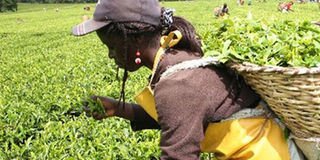Kenya’s tea sales to China hit hard by fresh regulation

Workers pluck tea at a farm in Nandi Hills. China has introduced rigorous checks on the fluoride content of Kenyan crop. This new check has seen exports to China — a key market that Kenya is banking on to grow sales — go down. PHOTO | FILE
What you need to know:
- Committee vice chairman, Mr Henry Ole Ndiema, said it was surprising that China, which exports more goods than it imports from Kenya, could set such an “unnecessary” requirement on the country’s tea.
- Britain, Pakistan, Egypt, Afghanistan and Sudan are Kenya’s traditional markets for tea. The tea directorate, however, says there are plans to diversify the markets in Africa to capture Ghana, Nigeria and Algeria.
Kenya’s efforts to increase tea exports to China have been hampered by a new standard set by the Asian country.
China has introduced rigorous checks on the fluoride content of Kenyan crop, the tea directorate has said. This new check has seen exports to China — a key market that Kenya is banking on to grow sales — go down.
“We have not yet understood why China has introduced this standard, which is the first requirement among all other tea markets including the traditional ones,” said Ms Elizabeth Kimenyi, the interim head of the tea directorate.
Already, the agency is in touch with the relevant authorities with a view to sort out the issue “as soon as possible” since China provides a huge market for local tea, Ms Kimenyi told the Senate committee on Agriculture, Livestock and Fisheries when it visited Mombasa tea auction, on Tuesday, last week.
In 2009, Kenya exported 918,140 kilos of tea to China, 510,866 in 2010, 2,112,197 in 2011 and 1,305,781 in 2012.
The exports, however, dropped to 922,828 in 2013 before rising marginally to 935,600 last year.
The decrease was attributed to the introduction of the fluoride content rule.
UNNECESSARY RULE
Committee vice chairman, Mr Henry Ole Ndiema, said it was surprising that China, which exports more goods than it imports from Kenya, could set such an “unnecessary” requirement on the country’s tea.
“Most of the lucrative infrastructural projects are being undertaken by Chinese companies and these ‘trade barriers’ are not acceptable,” Mr Ndiema said.
Britain, Pakistan, Egypt, Afghanistan and Sudan are Kenya’s traditional markets for tea. The tea directorate, however, says there are plans to diversify the markets in Africa to capture Ghana, Nigeria and Algeria.
“Our plans for market launch in West Africa had been delayed by the Ebola virus and elections in Nigeria. We now intend to carry out this activity in June and July,” she said.
At the same time, Mombasa tea auction is looking for funds to automate the centre in order to step-up accountability and transparency. The East African Tea Trade Association (EATTA) said the project will cost about Sh153 million ($1.7 million) although a donor is carrying out a survey to determine the exact cost.
Managing director, Mr Edward Mudibo, told the parliamentary committee that EATTA was committed to ensuring that the auction was automated to “clear the air” over allegations of price manipulation.
“We had initially hoped that the tea directorate would provide the funds, but after being told it was not possible, we approached Trade Mark East Africa, which is currently carrying out a study on the implementation procedure and we hope they will fund the project,” Mr Mudibo said.
MARKET FORCES
Tea prices at the auction increased from Sh181 ($2.02) in the first week of January to Sh225 ($2.50) in March, a 23 per cent jump, which was attributed to the dry spell being experienced across tea growing areas.
Mr Mudibo dismissed accusations of price-fixing at the auction, saying market forces of supply and demand are responsible for the decline in the last two years.
“ They (farmers) say that prices here are controlled by a cartel and yet you are telling us everything is okay?” Said Kilifi County Senator Stewart Madzayo.
“I think we need to establish the true facts about this auction and why prices fall and rise. In 2012 when prices were good farmers celebrated, which was not the case when production rose in 2013 and last year. People will want to look for scapegoats over this scenario but the truth is there is need for sensitisation on what happens here,” he said.





